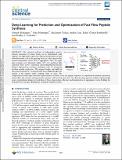Deep Learning for Prediction and Optimization of Fast-Flow Peptide Synthesis
Author(s)
Mohapatra, Somesh; Hartrampf, Nina; Poskus, Mackenzie; Loas, Andrei; Gómez-Bombarelli, Rafael; Pentelute, Bradley L; ... Show more Show less
DownloadPublished version (1.695Mb)
Publisher Policy
Publisher Policy
Article is made available in accordance with the publisher's policy and may be subject to US copyright law. Please refer to the publisher's site for terms of use.
Terms of use
Metadata
Show full item recordAbstract
© 2020 American Chemical Society. The chemical synthesis of polypeptides involves stepwise formation of amide bonds on an immobilized solid support. The high yields required for efficient incorporation of each individual amino acid in the growing chain are often impacted by sequence-dependent events such as aggregation. Here, we apply deep learning over ultraviolet-visible (UV-vis) analytical data collected from 35 »427 individual fluorenylmethyloxycarbonyl (Fmoc) deprotection reactions performed with an automated fast-flow peptide synthesizer. The integral, height, and width of these time-resolved UV-vis deprotection traces indirectly allow for analysis of the iterative amide coupling cycles on resin. The computational model maps structural representations of amino acids and peptide sequences to experimental synthesis parameters and predicts the outcome of deprotection reactions with less than 6% error. Our deep-learning approach enables experimentally aware computational design for prediction of Fmoc deprotection efficiency and minimization of aggregation events, building the foundation for real-time optimization of peptide synthesis in flow.
Date issued
2020Department
Massachusetts Institute of Technology. Department of Materials Science and Engineering; Massachusetts Institute of Technology. Department of ChemistryJournal
ACS Central Science
Publisher
American Chemical Society (ACS)
Citation
Mohapatra, Somesh, Hartrampf, Nina, Poskus, Mackenzie, Loas, Andrei, Gómez-Bombarelli, Rafael et al. 2020. "Deep Learning for Prediction and Optimization of Fast-Flow Peptide Synthesis." ACS Central Science, 6 (12).
Version: Final published version